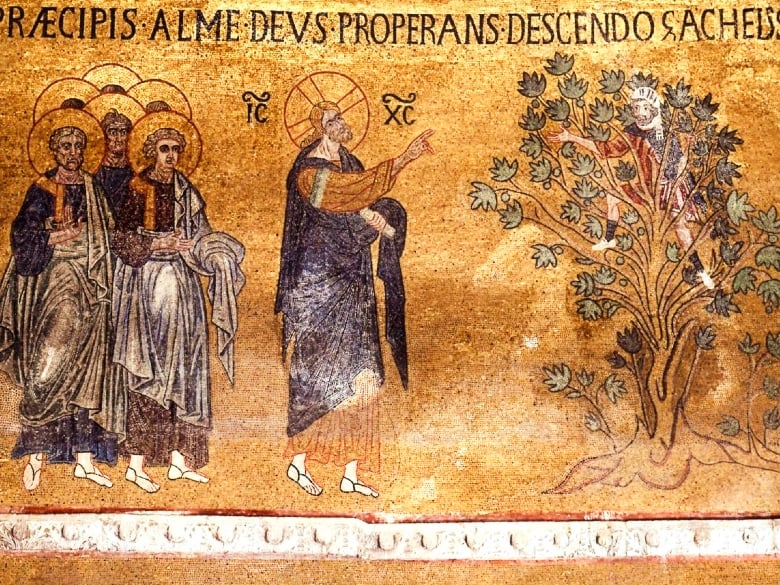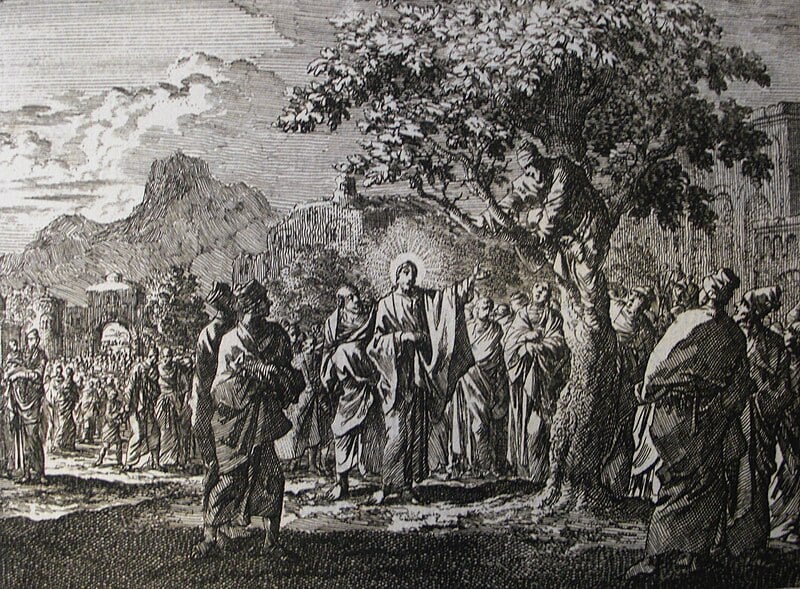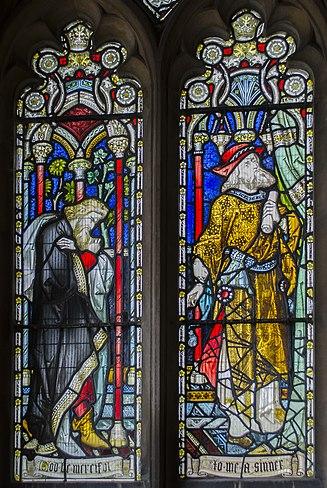
Called by Name
What if a closer look at the gospel story of Zacchaeus revealed a hidden connection—one that reshapes our understanding of how Jesus sought outcasts to restore justice in a world plagued by arrogance and corruption?
Jesus’s personal identification of Zacchaeus was not only a radical act of love but may also signal an association that, until now, has escaped the notice of scholars and theologians. By reexamining Zacchaeus’s narrative alongside Jesus’s parable of the tax collector and the Pharisee, we can evolve our understanding of how relational discipleship transforms lives and communities.
More Than a “Wee Little Man”
We all know the story. Many of us have even sang the familiar children’s song:
Zacchaeus was a wee little man,
And a wee little man was he.
He climbed up in a sycamore tree
For the Lord he wanted to see.And as the Savior passed that way
He looked up in the tree,
And he said, “Zacchaeus, you come down,
For I’m going to your house today!”
Exclusive to the gospel of Luke (19:1-10), the narrative tells us that this Jewish man was a chief tax collector in Jericho, an affluent community near Jerusalem. Although wealthy, Zacchaeus’s profession made him a pariah. In first-century Judea, tax collectors were reviled as collaborators with the oppressive Roman Empire—seen as traitors, thieves, and outcasts.
Scripture notes that Zacchaeus was “small in life” (Greek: ἡλικίᾳ μικρὸς), meaning that, indeed, he was short in stature, though some have interpreted that this particular remark could have been referring to Jesus himself. Either way, the narrative suggests that Zacchaeus had never previously encountered Jesus in the flesh, and that was specifically why he decided to ascend a sycamore fig tree so that he might see Jesus over the gathering crowd.
A Radical Invitation
When Jesus approached, he looked up to Zacchaeus, and called him by name, saying, “Zacchaeus, hurry and come down, for I must stay at your house today” (Luke 19:5b, NSRVue).

In this single, unexpected gesture, Jesus not only identified Zacchaeus by name, but also declared an intention to enter his home. In the culture of that time, for a rabbi to stay overnight with a notorious tax collector broke deep social, religious, and ethnic taboos. Yet for Jesus, this was the very embodiment of His mission—to seek and save the lost.
Growing up in the church, I assumed that Jesus must have supernaturally known Zacchaeus’s name—a view many scholars and believers share, attributing His insight to divine or even psychic ability.
But what if there is another explanation? What if Jesus’s identification of Zacchaeus was rooted in a deeper, previously unrecognized connection?
The Hidden Connection
It is not the only time in scripture that Jesus speaks boldly about someone he has never met before. Early in John’s gospel, when Jesus first encounters Nathanael, he declares him “a true Israelite, in whom there is no deceit” (John 1:47b, NRSVue). Nathanael’s astonishment at Jesus’s intimate knowledge is totally relatable: even if one does believe in supernatural clairvoyant abilities, such revelations are not automatically expected in any random encounter.
Yet in Luke 19, Zacchaeus “hurried down [the tree] and was happy to welcome him” (Luke 19:6, NRSVue). Zacchaeus’ reaction is happiness—no indication that he is even questioning why Jesus would want to stay with him, no hint of skepticism or questions in his heart—only glad acceptance.
How could this be? Earlier passages indicate Zacchaeus had never seen Jesus before—that’s precisely why he had climbed the tree in the first place.
But it doesn’t answer why Zacchaeus would even want to see Jesus.
And in a town filled with priests, why would Jesus choose to stay at the house of a chief tax collector?
The Ultimate Outcast
Though proficient in Aramaic, Hebrew, Greek, and Latin, tax collectors were local Jewish contractors who, by working for Rome, betrayed their own community. They were permitted to overcharge and keep the surplus, and the more they enriched themselves, the more they were despised.

Consequently, Zacchaeus would have been banned from synagogues and many parts of the Temple in Jerusalem. He was deemed ritually unclean by the Pharisees—effectively excluded from the spiritual life of his people and considered unworthy of any social interaction.
To say it should be surprising that Jesus chose Zacchaeus as his host that day in Jericho is an understatement. It is scandalous.
Significantly, it wasn’t the first time that a tax collector had been elevated by Jesus’s own words.
The Parable of the Tax Collector and the Pharisee
In the preceding chapter, Luke depicts Jesus telling a parable comparing two men who went up to the Temple in Jerusalem to pray.
The Pharisee in the story was a model of religious dedication: he thanked God that he was not like sinners—specifically the tax collector—and boasted of his excessive fasting and tithing. Jesus noted that the Pharisee prayed “to himself” (Greek: πρὸς ἑαυτὸν), adopting a posture of self-congratulation and superiority.
In contrast, the tax collector stood “far off” (Greek: μακρόθεν), physically distant—likely in the Court of Israel near the entrance to the Court of Women. His overly cautious distance was not simply a matter of physical placement but a manifestation of deep-seated exclusion. He knew the religious elite deemed him unworthy even to pray near them.

Instead of judging others, the tax collector beat his breast and prayed, “God, be merciful to me, the sinner!” Notice that Jesus records his prayer using “ἱλάσθητί” (hilastheti), a term linked to sacrificial atonement—almost as if he pleaded, “God, atone for me!” In a temple where tax collectors were by law forbidden from even offering a sacrifice, religiously speaking, he was beyond redemption.
The tax collector apparently took this very seriously, and did not merely consider himself a sinner among many; by calling himself “the” sinner (with the definite article “τῷ” in Greek), he acknowledged his extreme guilt.
Jesus concluded the parable by declaring, “I tell you, this man [the tax collector] went down to his home justified rather than the other, for all who exalt themselves, will be humbled, but all who humble themselves will be exalted.” (Luke 18:14, NRSVue)
In this parable, Jesus teaches that God does not see people the way the religious system does. Though the Temple excluded the tax collector, God embraced him.
I believe this parable provides definitive insight into Zacchaeus’s story, because I believe it is probable that the tax collector Jesus spoke of in the parable was Zacchaeus himself.
The Case for Zacchaeus
What if the story of Zacchaeus as presented in Luke 19 seems like only part of the story because it is just part of the story?
Several points support the possibility that Zacchaeus is the tax collector in Jesus’s parable:
Personal Recognition: The Pharisee in the parable recognized the other person as a tax collector. Though tax collectors undoubtedly were wealthy and their garments reflected their prosperity, there was no uniform, no name badges. If the Pharisee was able to identify him (correctly) as a tax collector, it is probable that he had had occasion to either interact with him, and possibly even knew him by name. Certainly the Pharisee’s denigration seems more than just stereotypical, as if there could have been personal rather than categorical knowledge feeding his prayer.
Behavioral Parallels: Zacchaeus, like the tax collector, sought not merely mercy, but atonement. Both climbed to connect with God: the tax collector mounted the many steps leading up to the temple, and Zacchaeus climbed a tree. And as we will find out, both responded with humility and penance when criticized for their very existence. If Zacchaeus was the tax collector in Jesus’s parable, it could provide several previously unconsidered explanations for why Zacchaeus would want to see Jesus in Jericho. If Jesus was retelling this parable, perhaps a word of the prayer at the Temple becoming a story told by Jesus had reached Zacchaeus.
Social Networks: As a chief tax collector in Jericho, Zacchaeus would have been known within local religious circles. It is plausible that a Pharisee, perhaps someone like Nicodemus (a Pharisee and member of the Sanhedrin) or another sympathetic figure associated with Jesus, could have observed Zacchaeus’s actions at the temple. In fact, every detail in the parable could have been observable from the perspective of the Pharisee, and the documentary details of the parable make it likely the original source of the story was the Pharisee, increasing the likelihood that the Pharisee could have told the story to Jesus. In fact, there is no other natural way Jesus could have known the Pharisee was actually praying “to himself” unless the Pharisee had told that to Jesus.
Internal Evidence: Several scholars [1, 2, 3, 4] have commented that the details of the story lead them to believe that it could be based on an actual event, and may not be fictional. Interestingly, of the thousands of available ancient variant manuscripts of Luke, every single manuscript that has the story of Zacchaeus also contains the parable of the tax collector and is always in close textual proximity.
Happy Ending

When Jesus called Zacchaeus by name and announced His intention to stay at his house, the crowd grumbled, “He has gone to be the guest of one who is a sinner” (Luke 19:7, NRSVue). In response, Zacchaeus declared he would give half his possessions to the poor and repay anyone he had defrauded four times over—a commitment that satisfied both Jewish and Roman law.
Significantly, this story on its own does not depict any crisis experience one could label “repentance.” And indeed, without hesitation, Jesus himself calls Zacchaeus a son of Abraham and declares to him, “Today salvation has come to this house…For the Son of Man came to seek out and save the lost” (Luke 19:9-10, NRSVue, interpolated).
By itself, this happy ending certainly reinforces Jesus’s commitment to the lost. But the message becomes so much more dynamic if we do consider the possibility Zacchaeus was indeed the tax collector Jesus described in the parable: a man crying out for atonement in the temple, aware of his unworthiness, and yet remained a social and religious outcast until Jesus affirmed him.
The Whole Story
If Zacchaeus is both the repentant tax collector of the parable and the man called by Jesus in Jericho, then discipleship emerges as a dynamic, ongoing process—not one confined to formal religious settings. Jesus redefines God’s kingdom as open to those who dare to embrace humility, repentance, and change. His approach is relational, transformative, and inclusive—meeting people exactly where they are, even if that means climbing a tree.
Here are other ways an expansion of Zacchaeus’s story could inform how we understand authentic Christlike discipleship:
Jesus Recognizes the Outcast Before Society: If Zacchaeus had already humbled himself before God in the temple but was still rejected by the people, it highlights how often religious and social structures fail to recognize true repentance. Jesus’s invitation shows that divine grace often precedes communal acceptance, pushing against the idea that one must be “approved” by the crowd before being embraced by God.
Grace Creates Transformation: If Zacchaeus longed for God’s mercy even before Jesus arrived, then Jesus’s act of staying with him wasn’t merely a reward for repentance—it confirmed a change already in motion. This shifts the focus from a transactional view of salvation (“repent and be accepted”) to a transformational one (“you are seen, and that recognition empowers change”).
Atonement as Identity: Zacchaeus could not atone according to Temple law, yet Jesus’s call identified him as a son of Abraham, pronouncing salvation over his entire household. This public restoration offered Zacchaeus an opportunity to align the actions of his life with justice and righteousness.
The Overlooked Are Often the Most Receptive: If Jesus learned of Zacchaeus’s secret prayer in the temple through Nicodemus or another Pharisee, it suggests that those on society’s margins may be the most spiritually awake. Meanwhile, the religious elite, who saw the tax collector praying, still refused him dignity—reinforcing Jesus’s teaching that the first will be last and the last first.
Public Restoration: If Zacchaeus had been quietly crying out for mercy in the temple yet remained a traitor in the eyes of his community, Jesus’s decision to stay at his house became not just a matter of individual salvation but a public restoration of a man long rejected. This mirrors other instances in the gospels where private faith is publicly affirmed.
The Inversion of Roles: If Zacchaeus is the same tax collector from the parable, then his role is flipped from one who benefits from exploitation to one who redistributes wealth. This inversion is evocative of Jesus’s broader vision, where all who humble themselves will be exalted, and those who seek mercy become agents of justice.
By linking Zacchaeus to the parable, the narrative becomes even more radical: a man despised for his profession was already seeking God, but it took Jesus’s recognition for the community to see what God had already been doing in him.
It shifts the idea of salvation from a moment of conversion to a longer, often hidden process—one that Jesus honors even when others don’t. If this is the completed story of Zacchaeus, it would exemplify Jesus’ inclusive approach to reach out to those who have been rejected and outcast. Jesus may have never laid eyes on Zacchaeus before, yet he called him by name and came to his table.
Real Change
By proclaiming salvation over Zacchaeus, Jesus did more than offer forgiveness—he pledged discipleship. Zacchaeus was the inverse of the rich young ruler, who clung to his wealth and walked away. Instead, Zacchaeus embodied true discipleship, just as those who left their nets and livelihoods to follow Jesus.
In a world brimming with deceit, corruption, and hatred, Zacchaeus became a man empowered by God to bring change within his reach. No matter how the religious community perceived him after that moment, he had the opportunity to make a difference—and he took it.
I could say we need more Zacchaeuses in the world, but they are already here. Who knows how God has already stirred their hearts? How many people like Zacchaeus are in your life, waiting to be called by name?
We must stop shaming them, stop judging them for their politics, their past, or the ways we feel they have betrayed us. We become like Jesus when we seek out, equip, and empower those whom society deems unworthy. When we stop congratulating ourselves for our own righteousness—and instead, sit at someone else’s table for a change.
For change.














